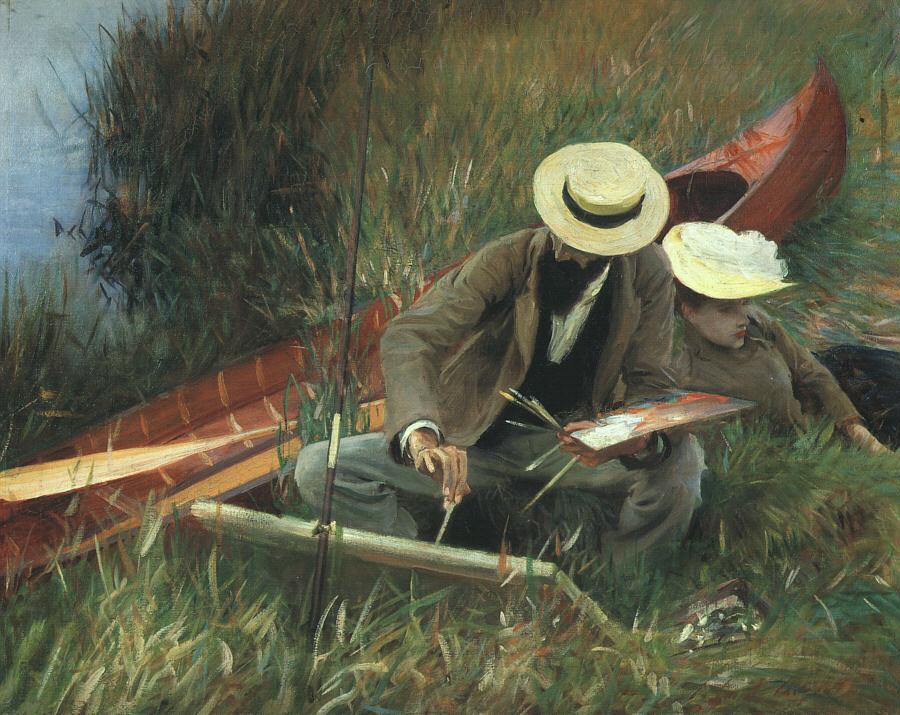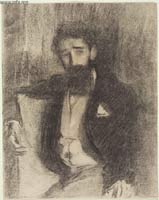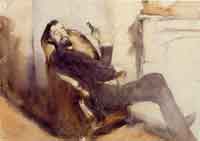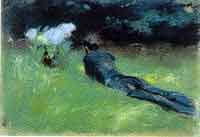Paul
Helleu Sketching
with his Wife
John
Singer
Sargent
-- American painter
1889
The
Brooklyn
Museum, NY
Oil on
canvas
26 1/8
x 32 1/8 in.
Museum
Collection Fund
Jpg: Jim's
Fine Art Collection
The painting was
given
very little
notice in the reviews when it was exhibited, however I find it one of
my
favorites of John's work and one of his truest Impressionistic
paintings.
Paul César
Helleu
(French,
1859-1927) met Alice Louise Guérin in Paris in 1884 and they
married
two years later. Alice became Paul's favorite model. Over the years he
painted her in oils, pastels, and lithographs. When they visited
Sargent
she was nineteen years old and he thirty.
Paul was one of
Sargent's
closest
friends. They had met in Paris in 1878 when Paul was 18 years old
and Sargent 22. Sargent was becoming known to the public and getting
commissions
for work. Helleu on the other hand at very low ebb in his life.
The story goes that Paul Helleu was terribly despondent,
financially
strapped with hardly any money to even eat. He was at the edge of the
precipice
of having to leave his studies in art for lack of funds. He had not
sold
anything and was deeply discouraged.
Sargent, having heard
this,
went
and visited Helleu at his gallery and without mentioning Paul's
financial
straights, picked out one of his paintings, and
praised its merits. Paul was so flattered the successful Sargent would
think so kindly of his work that he offered to give it to him.
<>Sargent responded,
"I
shall gladly
accept, Helleu, but not as a gift. I sell my own pictures, and I know
what
they cost me by the time they are out of my hand. I should never enjoy
this pastel if I hadn't paid you a fair and honest price for it." And
he
paid him a thousand-franc note. Paul had never even seen a
thousand-franc
note before (Charteris p.45).
<>Helleu never
forgot
that
and they
remained fast and dear friends. In Sargent's own troubled moments, as
when
the loss of his father, it was Paul and his wife, among others, who
visited
and stayed a while in England. And it was the two of them along with
other
artists that went to the Netherlands to in 1883 to study Frans
Hals.
Sargent
would sometimes paint portraits for his closest friends, and he would
present
them as gifts. Many of these might be seen as "unfinished" but they
weren't
meant to be. Another portrait was made for Paul as a gift
(thumbnail)
done sometime between 1885 and 1889.
Today we think of
John
Singer Sargent,
among other things, as one of the great American Impressionist artists.
But this was not always the case. In fact, the poor response he got
from
his early impressionist work for critical review made him shy away from
it for exhibition. He was, after all, hitting his stride with
portraitures
by the end of the 1880's and was considered one of the best.
After the tepid
response
of Paul
Helleu Sketching with his Wife Sargent stopped submitting his
impressionists
work for critical exhibition. Today, this painting is considered one of
Sargent's signature pieces and it's beauty and subtlety speaks for
itself.
In considering his
life,
it is so
difficult to fully grasp the incredible range of this man's talent.
Claude
Monet was undoubtedly the greatest impressionist, but it is hard to see
Monet painting Paul Helleu Sketching with the delicate touch
of a Portrait of Edouard and Marie-Louise Pailleron . . . .
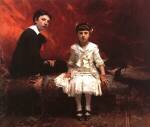
the brevity of
lines in a Study
for El Jaleo; the delicate blending of color in an Egyptian
Girl; the mastery of watercolors in a Villa
di Marlia, Lucca: The Balustrade; and there are so many other
examples
of depth and breadth of this man's talent. In fact, it is safe to say
that
a Paul Klee, a Vincent van Gogh, a Paul Gauguin, a Mark Rothko, or any of
them, didn't
have nearly the range of talent that Sargent had. John Singer Sargent
was
the last of his kind. He was the last great generalist.
Notes:
Exhibitions
John
Singer
Sargent,
An Exhibition -- Whitney
Museum, NY & The Art Institute of Chicago 1986-1987
Paul Klee
(1879-1940), A
Swiss-born painter and graphic artist -- primitive art, surrealism,
cubism,
and children's art all seem blended into his small-scale, delicate
paintings,
watercolors, and drawings.
Vincent van Gogh
(1853-1890)
Dutch postimpressionist painter whose work represents the archetype of
expressionism
Paul Gauguin
(1848-1903) French
postimpressionist painter whose lush color, flat two-dimensional forms,
and subject matter helped form the basis of modern art
Mark Rothko,(1903-1970)
American
abstract artist who hit his form in the 40's and 50,s (National
Gallery of Art)
|

